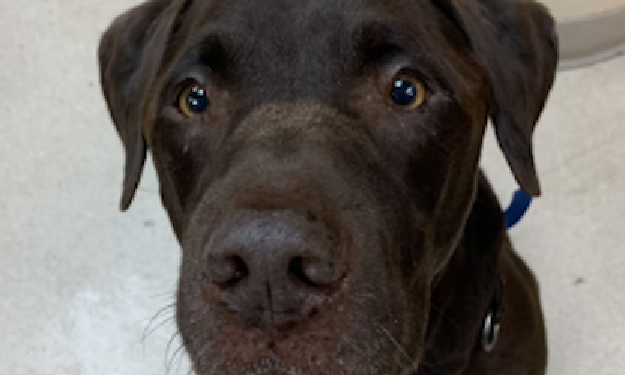Case Study: Xylitol Ingestion
June 24, 2021
Written by: Heather Ann Scott RVT, LVT, VTSECC
Presentation and Immediate Care
Meet Maka, an 8-year-old MN 34 kg Chocolate Labrador Retriever. Maka was seen at VERC June 16, 2021 by our emergency veterinarian, Dr. Maxine Koyanagi, for having eaten a large amount of Xylitol (an artificial sweetener used in sugar free foods).
Maka presented after having a seizure at home an hour following xylitol ingestion. When he arrived, he was obtunded and foaming at the mouth with a blood glucose of 36 mg/dL. His temperature, pulse and respirations were within normal limits. Because Maka’s owners knew the toxin that Maka has been exposed to, the emergency team was able to help him more quickly.
Maka received an IV catheter on arrival in addition to emergency intravenous dextrose supplementation, IV fluid therapy and anti-nausea medication. Maka ingested 13,705 mg/kg (466g total) which is far higher than the toxic dose of 0.1g -0.5 g/kg. Baseline liver, coagulation, and blood chemistries were also analyzed at this time.
Hospitalization and Treatments
Maka was continuously monitored for any further decreases in blood sugar throughout the night. This included serial blood glucose monitoring, continuous IV fluid therapy with dextrose supplementation, administration of N-acetylcysteine (a glutathione antioxidant producing liver protective medication), in addition to monitoring basic vital signs, blood pressure, as well as electrolyte and liver value monitoring.
Within the next 12 hours, Maka began to show signs of acute liver failure.
His liver and coagulation values began to significantly increase, causing concern for internal bleeding, hepatotoxicity and potentially a decline in his prognosis. Our criticalist Dr. Marcelle Hon continued his care for the remainder of his stay during the day with our emergency doctors continuing his care overnight. A peripherally inserted central catheter was placed by our advanced nursing staff to facilitate the continued monitoring of his blood values with the intent of eliminating further continued venipuncture.
Maka continued to receive other treatments previously initiated in addition to Vitamin B12, liver protective supplements and anti-vomiting medication. Maka’s vessels were also leaking as a result of his poor clotting factors and low albumin (a vital protein produced by the liver for maintaining osmotic pressure, nourishing of tissues, and the carrier of vitamins, transport hormones, drugs, calcium in addition to antithrombin and heparin cofactor). This caused his skin and IV insertion sites to ooze. Continuous maintenance and monitoring was required of the nursing staff to keep his IV sites as healthy and clean as possible.
It was determined that Maka needed to have a plasma transfusion in order to counteract the loss of coagulation factors related to his acute liver injury. Fresh Frozen Plasma contains all clotting factors including albumin. While administering plasma may not significantly increase albumin levels the overall addition of total clotting factors is helpful to patients experiencing loss of Maka receiving a double unit of fresh frozen plasma, he began to improve in mentation.
Outcome
His coagulation and liver values were still too high to read and a second double unit of fresh frozen plasma was administered overnight. Within the next 24 hours, Maka continued to improve. His appetite improved and he began to have more energy. After the second plasma transfusion was administered, the oozing at the catheter sites substantially decreased and his overall vital parameters stabilized.
Due to the hard work, detailed care, and tremendous dedication of the doctors and nursing staff, 72 hours after Maka presented, he was able to be discharged.
On his last day, Maka was barking, wagging his tail and had a voracious appetite. We hope Maka will stick with doggie treats in the future, and we are all so happy that he has made an amazing recovery.
- Maka’s Critical Care Medical Team: Lauren Johnson RVT, Ali Sueoka, and Dr. Marcelle Hon.
- Maka’s happy family.
More About Xylitol Poisoning
Xylitol, a five-carbon sugar alcohol, is commonly used in sugar free gum, baked goods, sugar-free candy, desserts, as well as some cereals, beverages and toothpaste. While Xylitol is considered harmless to humans, it is unfortunately highly toxic to canine patients (its effect on feline patients is still being studied and remains debated). The use of xylitol as a sugar substitute has gained increasing popularity due to its low glycemic impact when compared to regular sugar. Xylitol can cause profound hypoglycemia (low blood sugar) as well as hepatotoxicosis (chemically driven liver damage) in canine patients.
Peak plasma levels of xylitol in canines can be reached after only 30 minutes post ingestion. Xylitol causes a large release of insulin from the pancreas; this causes a significant drop in blood glucose levels. Hypoglycemia usually occurs within 30 to 60 minutes after ingestion; however, it can be delayed for up to 12 to 48 hours after ingestion. Signs and symptoms related to xylitol ingestion include vomiting, lethargy, ataxia, tremors, seizures, collapse, and can lead to death if left untreated.
In some cases, after the significant release of insulin occurs, hyperglycemia can be seen as a presumed result of a phenomenon called the “Somogyi effect”. This is hypothesized to occur because of the body’s response to the profound decline in blood glucose due to the large amount of insulin released (much like in insulin overdose cases). In turn, this stimulates the release of hormones which include glucagon, epinephrine, cortisol, and growth hormone, which in turn leads to “rebound hyperglycemia”. Other derangements related to the effects of this toxin include electrolyte abnormalities (hypokalemia, hyponatremia, hypo and hyperphosphatemia) and coagulation abnormalities. Emergency treatment and continuous monitoring is vital to a positive outcome in these cases.

